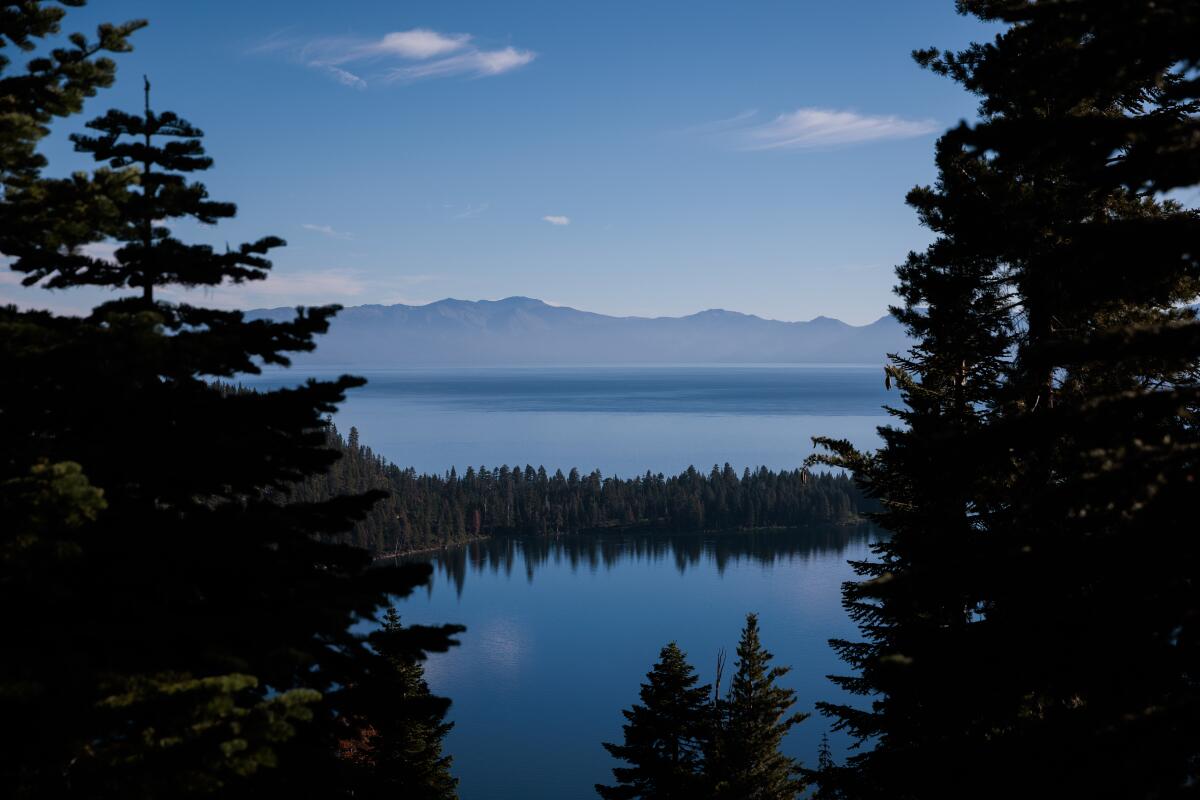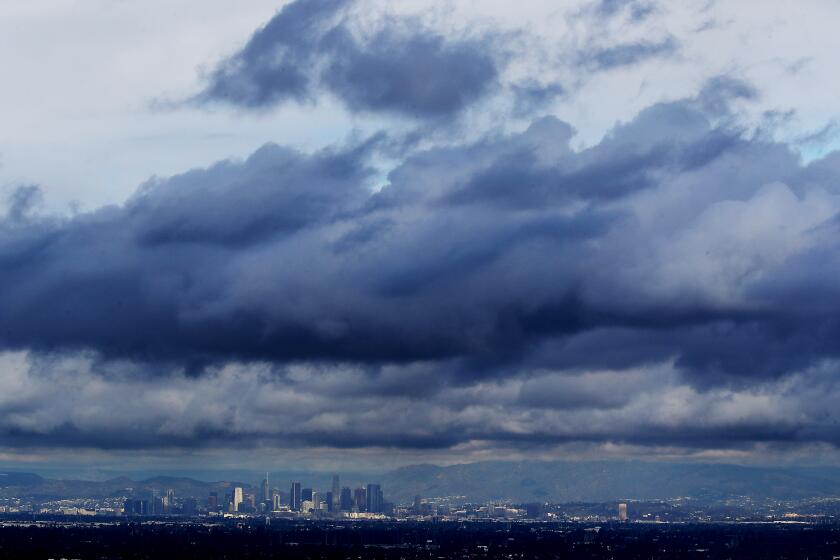The Hollywood writers’ strike ended. Writers’ struggles have not

- Share via
Good morning. It’s Monday, May 13. Here’s what you need to know to start your day.
- Hollywood writers are still struggling after their historic strike.
- Lake Tahoe may be full for the first time in five years.
- Meet the Running Mamis — a running club for Latina moms.
- And here’s today’s e-newspaper.
You're reading the Essential California newsletter
Our reporters guide you through our biggest news, features and recommendations every morning.
You may occasionally receive promotional content from the Los Angeles Times.
Hollywood writers are still struggling. Blame the decline of peak TV
This time last year, Hollywood writers put down their scripts and picked up picket signs in what became a 146-day strike. Their top demands of the traditional studios and streaming giants that employ them were increased pay rates and better residual payments for streaming shows, plus new rules for how artificial intelligence can be used.
The strike ended in late September when the Writers Guild of America reached a deal with the Alliance of Motion Picture and Television Producers. More than a half a year later, how are writers doing?
Not great, according to Times entertainment industry reporters Christi Carras and Stacy Perman. They checked in with multiple film and TV writers in various stages of their careers to understand what the industry looks like now.
“All said that either they or their colleagues have struggled to find work for at least 12 months amid a contraction that has led to unstable production and employment levels across the entertainment industry,” Christi and Stacy reported this week. “The so-called peak TV era that enabled 599 original scripted series to land in a single year is over, likely never to return.”
Film-production activity in the first quarter of 2024 (which includes movies, TV shows, commercials and more) was 20.5% lower than the five-year average, according to data from FilmLA. Production also fell about 7% globally in the first quarter compared with a year earlier, research shows.
What’s behind the shrinking of the industry? It’s not just the work stoppage. Production levels had been waning even before the strike, Christi and Stacy explained, as a result of the decline of the so-called streaming wars.
In a bid to compete with the success of Netflix, studios and companies poured money into an increasing slate of shows and films. But the surges in production simply were not sustainable, and companies began to cut back.
Another factor: consolidation. As entertainment companies merge and/or acquire the competition, that leaves fewer places for creators to pitch and sell their shows and films.
The CW Network was sold to Nexstar Media Group; Walt Disney Co. acquired 21st Century Fox; WarnerMedia merged with Discovery. And it’s possible that Paramount could be sold soon.
Those diminished opportunities are affecting writers from underrepresented groups in particular. For instance, peak TV programs such as FX’s “Reservation Dogs” and Peacock’s “Rutherford Falls” are centered on Indigenous characters, and thus there were more openings for Indigenous writers and actors. But those shows are no longer being produced.
With fewer options, writers told Stacy and Christi that they’re turning to fallback plans, like flipping furniture or dog grooming.
“I really, really worry about these young writers, and ... sometimes I feel guilt — like I should be talking them into doing something else with their lives,” veteran writer Ted Sullivan told them. “But nothing would have stopped me. And I know that nothing will stop them.”
Some writers do believe the hard-fought gains in the new WGA contract will eventually help reverse some of the fallout from peak TV’s decline.
“But until the rest of the industry bounces back, the wounds could take some time to fully heal,” Christi and Stacy wrote. “‘Survive to ’25’ is a sentiment that writers have begun to internalize.”
You can read more of their reporting in this Times subscriber exclusive.
Today’s top stories

Health, climate and environment
- Lake Tahoe is expected to fill up for the first time in five years, thanks to the state’s notably wetter back-to-back winters.
- El Niño is on a steady retreat, and the Pacific could return to neutral conditions this summer, according to scientists at the National Oceanic and Atmospheric Administration. But there’s also a 60% chance that La Niña will arrive by August.
- Despite H5N1 bird flu outbreaks in dairy cattle, raw-milk enthusiasts are uncowed.
Politics
- Here’s what to know about Laura Friedman, the pool-playing assemblywoman who probably will succeed Rep. Adam Schiff.
- President Biden raised millions of dollars in the San Francisco Bay Area last week and said his campaign is underestimated.
- L.A. City Council President Paul Krekorian did a U-turn on scandal-tainted colleagues.
- Column: What a surly California governor’s race can — and can’t — tell us about the Biden-Trump rematch.
Graduations and Gaza war protests
- UC Berkeley’s commencement ceremony was interrupted by chants of “Hey hey, ho ho, the occupation has got to go!”
- Pomona College moved its Sunday graduation ceremony to L.A. after protesters occupied the stage.
Dodgers
- You’ve heard this one already this season: The Padres defeated the Dodgers.
- We take you inside young Clayton Kershaw’s fight to save his career and learn a unique pitch.
- Dylan Hernández: Dave Roberts does his job, which is to protect Shohei Ohtani from himself.
More stories
- Roger Corman, the independent-cinema pioneer known as the king of B movies, has died at 98.
- L.A. Mayor Karen Bass’ German shepherd helped stop a man who broke into her home last month, sources have told The Times.
- Rudy Moreno, a popular comedian known as “the Godfather of Latino comedy,” has died at 66.
- Federal prosecutors are recommending a 40-year sentence for the man who attacked Nancy Pelosi’s husband with a hammer in an attempt to kidnap the U.S. House speaker.
- Police said a motorcyclist fatally shot a 19-year-old man driving on the 10 Freeway in Covina and remained at large.
- Three people were killed and three others seriously injured when a speeding Tesla hit a curb, struck a power pole, then crashed into a building in Pasadena.
- Sheriff’s Department official on the decision to cover an alleged deputy gang tattoo: ‘Embarrassed.’
Get unlimited access to the Los Angeles Times. Subscribe here.
Commentary and opinions
- George Skelton: Lots of complaining about California’s tax system. Time to fix it.
- LZ Granderson: Biden is right to nudge Israel toward protecting civilians in Rafah.
- Jackie Calmes: Our elections have integrity. These politicians do not.
- Steve Lopez: “An apple a day keeps the doctor away” is a big fat lie.
- Carla Hall: Being a porn star doesn’t make Stormy Daniels a liar. Trump’s lawyer should have known that.
- Editorial: Biden’s plan to reschedule marijuana may finally end “Reefer Madness.”
Today’s great reads

The Running Mamis are helping Latina moms go the distance.
Meet the Running Mamis — a running club for Latina moms. The Boyle Heights-based club was founded in 2018 to provide a safe space for mothers to run with their babies in tow without the threat of catcalls and cracked sidewalks. “We see each other and hold each other without judgment,” club co-founder Jo Anna Mixpe Ley said. “Doing that while moving helps you process and move forward. It’s liberating.”
How can we make this newsletter more useful? Send comments to [email protected].
For your downtime

Going out
- 🌹 Here are six stunning L.A. gardens where you can stop and smell the roses (literally).
- 🍗 Fried chicken fans are flocking to a new viral shop in Hacienda Heights. Is it worth the hype (and long lines)?
Staying in
- 🔪 Here’s how to make the most of California asparagus season, while you can.
- 🧑🍳 Here’s a recipe for smoked salmon sando.
- ✏️ Get our free daily crossword puzzle, sudoku, word search and arcade games.
And finally ... a great photo
Show us your favorite place in California! We’re running low on submissions. Send us photos that scream California and we may feature them in an edition of Essential California.

Today’s great photo is from Times staff photographer Robert Gauthier, who visited the San Ysidro border crossing. Hundreds of asylum seekers were there for interviews, having used a Customs and Border Protection app to make appointments. Immigrant advocates say the app, CBP One, is prone to glitches and turns people’s right of asylum into a lottery and dangerous waiting game.
Have a great day, from the Essential California team
Ryan Fonseca, reporter
Amy Hubbard, deputy editor, Fast Break
Check our top stories, topics and the latest articles on latimes.com.
Sign up for Essential California
The most important California stories and recommendations in your inbox every morning.
You may occasionally receive promotional content from the Los Angeles Times.




